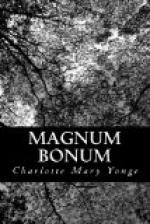“Are you coming back, dear old man?” said Jock, with eyes fixed on him.
“I don’t know. Tell me one thing, old man: I always thought, when you took to using your brains and getting up physical science, that you must get beyond what satisfied you as a soldier. Now, have the two, science and religion, never clashed, or have you kept them apart?”
“They’ve worked in together,” said Jock.
“You don’t say so because you ought, and think it good for me?”
“As if I could, lying here. ’All Thy works praise Thee, O God, and Thy saints do magnify Thee.’”
Bobus was not sure whether this were a conscious reply, or only wandering, and his mother here came in, wakened by the murmur of voices.
The brothers could not bear to lose sight of one another, though Jock was too much exhausted by this conversation, and, by the sickness that followed any endeavour to take food, to speak much again. Thus, when the Rector came, Bobus asked whether he must be sent out of the room, Jock made an earnest sign to the contrary, and he stayed.
There was of course nothing to concern him, especially in the brief reading and prayer; but his mother, looking up, saw that he was finding out the passage in the little Greek Testament.
Janet’s lay on a little table close by the bedside. The two copies had met again. The work of one was done. Was the work of the other doing at last?
However that might be, nothing could be gentler, tenderer, or more considerate towards his mother than was Bobus, and her kind friends felt much relieved of their fears for her, since she had such a son to take care of her.
Towards the evening, the negro servant knocked at the door, and Bobus took from him a telegram envelope. His mother opened it and read:
“Friar Brownlow to Mrs. Brownlow. I embark to-day.”
A smile shone out on Jock’s white weary face, and he said, “Good old Monk! If I can but hold out till he comes, I shall get home again yet. I should like to do him credit.”
“Ashton Vineyard, October l2th.
“MY DEAREST CHILD,-You know the main fact by telegram, and now I can write, I must tell you all in more order. We thought our darkest hour was over when the dear John’s telegram came, and the hope helped us up a little while. To Jock himself it was like a drowning man clinging to a rope with the more exertion because he knew that a boat was putting off. At least so it was at first, but as his strength faded, his brain could not grasp the notion any longer, and he generally seemed to be fancying himself on the snow with Armine, still however looking for John to come and save them, and sometimes, too, talking about Cecil, and being a true brother in arms, a faithful servant and soldier. The long severe strain of study, work, and all the rest which he has gone through, body and mind, coming on a heart already not quite sound, throughout the




